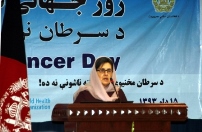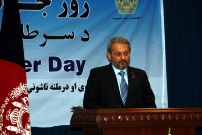 Afghanistan's First Lady Rula Ghani delivered a speech during the World Cancer Day event held in KabulKabul 4 February 2015 - World Cancer Day was observed today in Afghanistan at an event which brought together key health sector stakeholders and senior government officials to highlight the need for stronger measures in the fight against cancer. Cancer is a leading cause of morbidity and mortality worldwide, accounting for 8.2 million deaths in 2012.
Afghanistan's First Lady Rula Ghani delivered a speech during the World Cancer Day event held in KabulKabul 4 February 2015 - World Cancer Day was observed today in Afghanistan at an event which brought together key health sector stakeholders and senior government officials to highlight the need for stronger measures in the fight against cancer. Cancer is a leading cause of morbidity and mortality worldwide, accounting for 8.2 million deaths in 2012.
Afghanistan’s Chief Executive Officer Abdullah Abdullah pledged the government’s support to the battle against cancer in his message to the audience, noting that the global cancer burden is constantly growing. Minister of Public Health Dr Firozuddin Feroz emphasized that many cancer deaths could be prevented by modifying or avoiding key risk factors, including tobacco use, obesity, unhealthy diets and lack of physical activity.
Speaking at the event, the First Lady of Afghanistan Rula Ghani said: “cancer is a dangerous disease as it doesn’t always have clear signs and symptoms. Screening and early diagnosis are crucial.” WHO Country Representative Dr Rik Peeperkorn emphasized the important role prevention plays as an effective long-term strategy for cancer control. “Investing in cancer prevention is cheaper and more efficient than dealing with its consequences,” said Dr Peeperkorn.
Tobacco use is one of the single most important risk factors for cancer. “New tobacco law which would bring with it an increase in tobacco taxation is already endorsed by the Afghan parliament, but still it needs to be implemented. It has been proven in many countries that implementing a substantial tax increase leads to reduced tobacco use and will help to prevent associated cancer,” Dr Peeperkorn said.
 Minister of Public Health Dr Firozuddin Feroz underlined that many cancer deaths are preventableData on the burden of cancer in Afghanistan is scarce and often not of good quality, making it difficult to assess the impact of cancer in the country. Limited evidence suggests that the most common cancers in Afghanistan are stomach, breast, esophagus, lung and oral cavity. “Equipping healthcare workers with the right tools and knowledge to recognize early signs and symptoms of cancer is essential. One in three people will develop cancer in their lifetime – this means cancer affects all of us in one way or another, as colleagues, family members, friends,” said Dr Peeperkorn.
Minister of Public Health Dr Firozuddin Feroz underlined that many cancer deaths are preventableData on the burden of cancer in Afghanistan is scarce and often not of good quality, making it difficult to assess the impact of cancer in the country. Limited evidence suggests that the most common cancers in Afghanistan are stomach, breast, esophagus, lung and oral cavity. “Equipping healthcare workers with the right tools and knowledge to recognize early signs and symptoms of cancer is essential. One in three people will develop cancer in their lifetime – this means cancer affects all of us in one way or another, as colleagues, family members, friends,” said Dr Peeperkorn.
WHO has supported Afghanistan’s Ministry of Public Health (MoPH) in the integration of cervical and breast cancer screening and detection procedures in the country’s Reproductive and Maternal Health Strategy for 2013-2016. A technical working group consisting of UN agencies and MoPH has been established to develop guidelines and a comprehensive training package to build healthcare providers’ capacity in the screening and detection of cervical and breast cancer.
“Ensuring access to early detection programmes for cancer can reduce the cancer burden in all countries, including in Afghanistan. Screening is crucial – for example it has been shown that screening can reduce deaths from cervical cancer by 80 percent or more among women,” says Dr Malalai Nejaby, programme manager at the Non-communicable Disease Unit at WHO Afghanistan. “The emotional and mental impacts of cancer are issues that must be taken as seriously as the physical impacts,” she says.
Globally WHO works with partners to increase political commitment for cancer prevention and control, coordinate and conduct research on the causes of cancer and monitor the cancer burden. Together with partners, WHO develops standards and tools to guide the planning and implementation of interventions for prevention, early detection, treatment and care and strengthen health systems at national and local levels to deliver cure and care for cancer patients.








